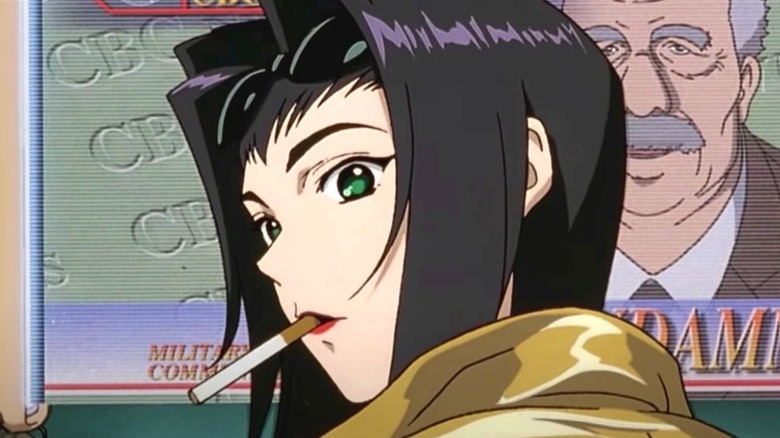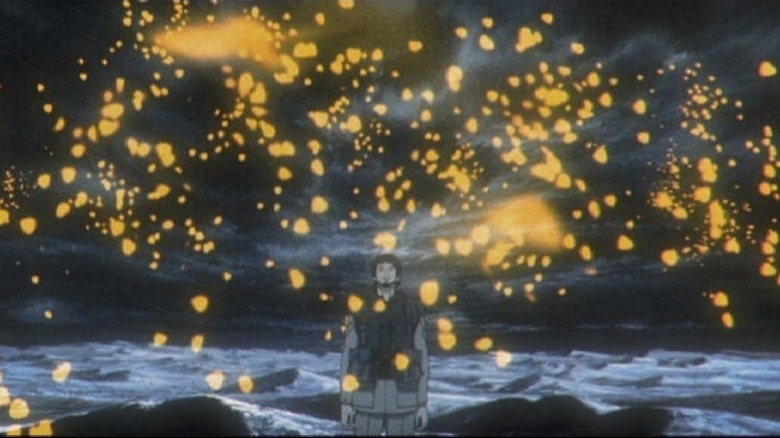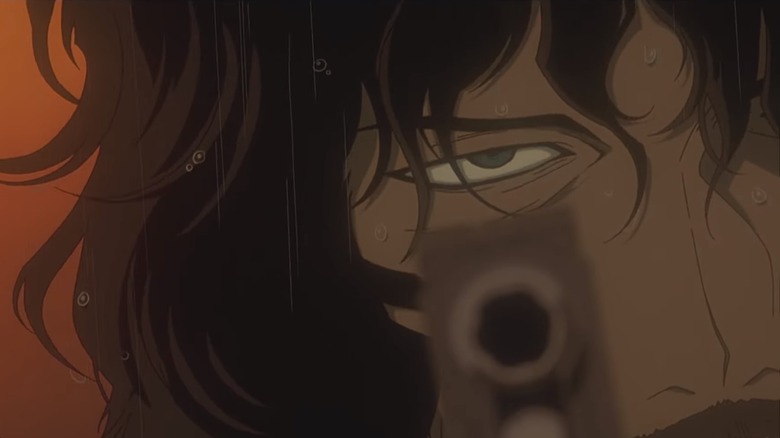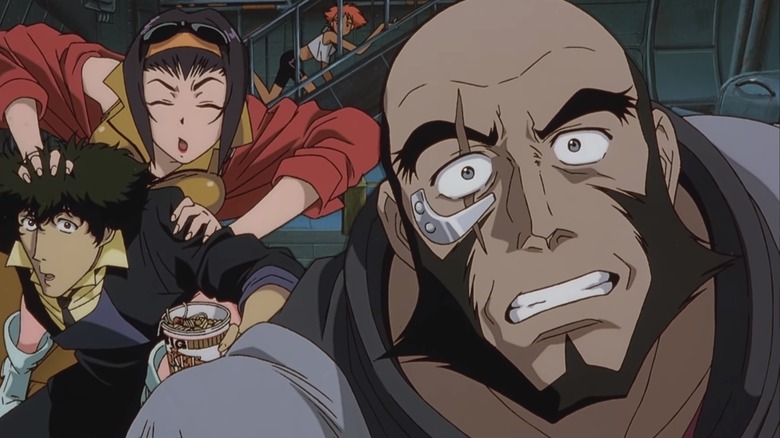The Ending Of Cowboy Bebop: The Movie Explained
The standalone anime film "Cowboy Bebop: The Movie," whose original Japanese title translated roughly to "Cowboy Bebop: Knockin' On Heaven's Door," ultimately didn't do much to change the status quo for fans. Instead of expanding the "Cowboy Bebop" timeline with events from before or after the show, the film instead exists firmly within the original timeline.
Sunrise, the animation studio that developed "Cowboy Bebop" and the film, even went so far as to officially place the movie in the gap between Episode 22 and Episode 23. This means that the entire Bebop crew is assembled and firing on all cylinders, but it also means that it is one of their last adventures before they begin to part ways.
Beyond that, the bounty they pursue, Vincent Volaju (Daran Norris), isn't particularly elaborate, although he does stand with Vicious (Skip Stellrecht) as one of the most ambitious and dangerous opponents the crew meets. Like some other important characters in "Cowboy Bebop," Vincent is a man haunted by a past he cannot fully remember outside of the trauma he finds himself reliving in the present. His solution to his ennui and confused existence? To wipe out the population of Mars with the same deadly nanovirus that stole his past.
Thankfully, the crew of the Bebop comes together to thwart Vincent's misguided quest for revenge, and viewers even see him find a portion of the peace he seemed to have longed for. Here is the ending of "Cowboy Bebop: The Movie" explained.
Vincent's butterflies signify the waking dream he feels trapped in
Spike Spiegal (Steve Blum) finds Vincent at "The bridge where Heaven meets the Earth," an apparent replica of the Eiffel Tower, in the film's final moments. As the two engage in some intense hand-to-hand combat, Spike taunts Vincent to release the virus, confident that his airborne vaccine and planned rainstorm will keep the population safe. However, once the virus does get out, Spike is immediately affected and begins to see the same butterflies that have driven Vincent insane, giving the terrorist the upper hand.
While holding him at gunpoint, Vincent asks Spike if he can tell him which world is real, the world that the butterflies have shown him or the one he knew before, from his time on Titan, where he thinks he died. As explained earlier in the film, the butterflies Vincent sees result from the nanovirus breaking down into proteins in the eyes, and now Spike, and presumably the rest of Mars, are experiencing those same hallucinations.
Vincent's internal conflict is that he has had his memories and connection to reality stolen from him by the experimental nanovirus and vaccine he was subjected to. The former special forces operative's memory loss and the otherworldly glowing orange butterflies he sees at all times make him unable to identify whether the world around him is real. Ultimately, Vincent feels trapped in the dream state he has felt since he escaped Titan and seems to feel that only by spreading his psychosis to the rest of the world can he "find the door" back to reality.
A brief glimpse into his past shows Vincent that there is no door
When Elektra (Jennifer Hale) arrives and tells Vincent that she is ready to die with him, it doesn't seem to register at first as he aims for his former romantic partner. However, something seems to change in those moments, and he never pulls the trigger. Elektra closes her eyes, fires, and then cries out in shock when she finds herself unhurt and Vincent fatally wounded.
Spike demands to know why Vincent didn't return fire, to which he responds that he finally remembered Elektra was the woman he loved. While it is never explicitly stated what about that situation caused him to finally access the memories stolen from him by the trauma on Titan, something shocks Vincent into realizing that he remains in the real world. Beyond that, he existed in a world in which he had once been happy with Elektra, but one that held no door through which he could leave.
Vincent dies with the realization that while he never left the real world, his existence ended when he was injected with experimental bioweapons on Titan. That torturous experience cost him anything resembling a chance at a normal life. While Vincent doesn't express much remorse for attempting to poison everyone on Mars, he does at least tell Elektra that he was happy to see her one last time, as the shared hallucinations of the glowing butterflies disappear with the rain dispersed vaccine.
What does all of this mean for the crew of the Bebop?
With Vincent's death and the successful distribution of the vaccine, the movie makes it look like life is ready to go back to normal on Mars, with Faye (Wendee Lee) even suggesting to Jet (Beau Billingslea) that they head to the race track to unwind. While the crew's interactions with Vincent would go down as one of the more involved adventures they undertook, given the already established storyline of the series, there was little the film could do to alter events significantly.
Being placed in between Episode 22, "Cowboy Funk," and Episode 23, "Brain Scratch Fever," means that "Cowboy Bebop: The Movie" is only one episode removed from the first significant breakup in the Bebop crew, which occurs when Ed and Ein leave in "Hard Luck Woman." After that, the show begins its two-part finale, "The Real Folk Blues."
While "Cowboy Bebop: The Movie" might not move the needle on the overall ending of the "Cowboy Bebop" series, Vincent's obsession with finding a door to another reality provides a contrast to Vicious' interpretation of his relationship with Spike. In just a few episodes, as Spike and Vicious square up in their climactic fight, Vicious says, "So you are finally awake. I told you before, Spike, that I am the only one who can kill you."
Like Vincent, Vicious appears convinced that his past and present seem stuck in varying states of unreality. However, unlike Vincent, Vicious believes that another person, Spike, is the key to understanding that confusion.



